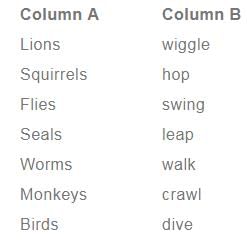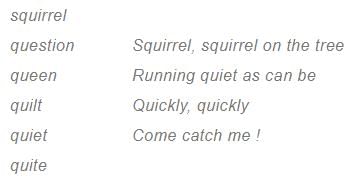NCERT Solutions for Class 3 English Unit 1 - How Creatures Move
Page No 97:
Question 1: Learn New Words
A) Padded
B) Limb
C) Crawl
D) Dive
E) Wiggles
Answer:
A) Padded: to fill something with a soft material to make it soft Example sentences:
1) I got the letter in a padded envelope.
2) The children have padded headphones.
B) Limb: an arm or a leg Example sentences:
1) The monkeys walk on a tree with their limbs.
2) The doctor treated his sore limbs.
C) Crawl: to walk slowly using hands and knees Example sentences:
1) The insects crawl under the tree.
2) The crab crawls on the sand.
D) Dive: to jump into the water Example sentences:
1) I am afraid to dive from the board to the pool.
2) The students enjoyed to dive.
E) Wiggles: to move from up and down or from side to side Example sentences:
1) She wiggles on her toes during the class.
2) Harsh wiggles his eyebrows looking at the cake.
Page No 98:
Question 1: Underline all the action words in the poem.
Answer: The lion walks on paddes paws, The squirrel leaps from limb to limb, While flies can crawl straight up a wall, And seals can dive and swim. The worm he wiggles all around, The monkey swings by his tail, And birds may hop upon the ground Or spread their wings and sail. But boys and girls Have much more fun: They leap and dance And walk and run.
Question 2: Why do boys and girls have the most fun?
Answer: Boys and girls have more fun because they can leap, dance, walk and run.
Question 3:
1. Match the words in Column A with those in Column B. 2. Now make sentences of your own using the matching words.
2. Now make sentences of your own using the matching words.
Example — The seals dive into the icy water.
3. Arrange these movement words from slow to fast.
| run | walk | hop | crawl |
4. Underline the letters which are silent in the following words:
| walk | straight | more | caught | calm | talk |
Answer:
1.
| Column A | Column B |
| Lions | walk |
| Squirrels | leap |
| Flies | crawl |
| Seals | dive |
| Worms | wiggle |
| Monkeys | swing |
| Birds | hop |
2)
1) The flies crawl on the wall.
2) The seals dive into the water.
3) The worms wiggle on the clothes.
4) The monkeys swing on the trees.
5) The birds hop on the stairs.
3) Crawl, walk, hop, run
4) Walk
Straight
More
Caught
Calm
Talk
Page No 99:
Question 1: What do you do when you are bored?
What do you do when you are bored?
Lakshmamma sings a song when she is bored.
Ratnakar reads a book.
Gopal talks to his friends. Anjaiah writes a story. Leelamma goes for a walk. Prabhakar goes to sleep.
What do you do when you are bored?
Answer:
squirrel
question
queen
quilt
quiet
quite
I watch television when I get bored.
Disclaimer: This a sample answer. Students are advised to write the answer based on their own experience and observation.
|
51 videos|346 docs|72 tests
|
FAQs on NCERT Solutions for Class 3 English Unit 1 - How Creatures Move
| 1. How do creatures move? |  |
| 2. What are the different types of movements exhibited by creatures? |  |
| 3. How do creatures adapt their movements to their environments? |  |
| 4. What are some examples of creatures that exhibit unique forms of movement? |  |
| 5. How does the movement of creatures contribute to their survival? |  |
















